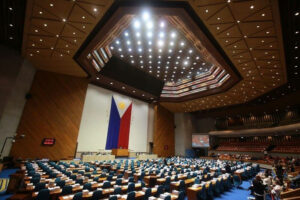
House approves economic ‘Cha-cha’ on 2nd reading
By Kenneth Christiane L. Basilio
THE House of Representatives on Wednesday approved on second reading a proposal to lift foreign ownership restrictions in the 1987 Philippine Constitution as part of efforts to boost foreign direct investments (FDI) in a country that is one of the least attractive in Southeast Asia.
Through a voice vote, congressmen agreed to liberalize the country’s public utilities, educational institutions and the advertising industry, saying these would benefit from increased foreign capital.
Lawmakers inserted the phrase “unless otherwise provided by law” in the provisions of the Charter with economic restrictions.
This gives Congress the leeway to legislate changes later, including the safeguards, investment ratios and other details, Cagayan de Oro Rep. Rufus B. Rodriguez, who sponsored the Resolution of Both Houses No. 7, said during plenary debates.
The Philippines is under pressure to attract more foreign direct investments to increase jobs and funding for development projects. FDI in Southeast Asia rose by 5.5% to a record $224 billion in 2022, the Association of Southeast Asian Nations (ASEAN) said in a report in December.
Of the total, the Philippines only got $9.2 billion, better only than Cambodia with $3.6 billion, Myanmar with $3 billion, Lao PDR with $600 million and Brunei with a $300-million net outflow, it said.
In contrast, Singapore had $141.2 billion, followed by Indonesia with $22 billion, Vietnam with $17.9 billion, Malaysia with $17.1 billion and Thailand with $9.9 billion.
FDI inflows to the Philippines slumped for a second straight year in 2023 amid sluggish global economic growth and geopolitical tensions, the Bangko Sentral ng Pilipinas (BSP) said on March 11. Net inflows dropped by 6.6% to $8.9 billion from a year earlier, according to BSP data.
“They’re running the risk of unconstitutional vagueness,” Hansley A. Juliano, who teaches political science at the Ateneo de Manila University, said in a Facebook Messenger chat. “The scope of ‘unless otherwise provided by law’ belies accountability to other aspects of the whole Charter.”
But Calixto V. Chikiamco, president of the Foundation for Economic Freedom, said congressmen should have added the phrase to other economic restrictions in the Constitution.
“Ideally, the insertion of the phrase ‘unless otherwise provided by law’ should also have been applied to the other sectors of the economy like natural resources and mass media,” he told BusinessWorld via Viber before the House approval. “But it was constrained by the Senate resolution, which only targeted public utilities, education and advertising.”
Jose Enrique “Sonny” A. Africa, executive director of think tank Ibon Foundation, called the House proceedings on economic Charter change (Cha-cha) “a tangle of fallacies and falsehoods, misinformation and disinformation, and denialism and dogma.”
He said the Philippine economy is already among the most open in Southeast Asian. “The remaining reserved utilities along with schools and advertising are barely 6% of gross domestic product, so only a tiny part of the economy still has restrictions,” he said in a Viber message before the House approval.
Filomeno S. Sta. Ana III, Action for Economic Reform coordinator, said pieces of legislation including changes to the Public Service Act have eased foreign ownership limits.
Senate President Juan Miguel F. Zubiri earlier said getting votes to pass economic Charter change would be a “big challenge” in the Senate.



